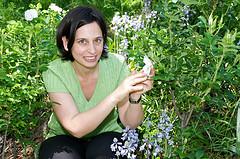Dr. Yael Wyner helms City College’s Science Education program, serving as Director since 2023 — and to hear her tell it, science education is more than just a field of study in City’s teacher education segment, but an avenue to critical thinking and a deeper understanding of the natural world.

Dr. Yael Wyner. Photo: CCNY.
“It can be difficult for people to understand what is supported by evidence and what is not supported by evidence, and to also not be ideologically driven when you are considering hypothesis testing and scientific research,” Wyner told The RICC about the challenges of science education.
On top of the science courses students in the science education track take, there’s a course specifically devoted to the nature of science, one Wyner said is particularly fun to teach.
In the class, students are shown different ways researchers can skew or manipulate data to corroborate an agenda, and how they go wrong — one example: a car insurance company that once falsely claimed customers who signed an odometer reading–honesty document before agreeing to a policy were more likely to honestly report their readings than those who signed it afterward.
“I want to instill a healthy skepticism, while emphasizing the importance of evidence-based practices in science,” Wyner said.
A passionate advocate for equipping future educators, Wyner has helped shape opportunities for students to teach science in both formal and informal education settings through innovative programs and a commitment to experiential learning.
She oversees two programs within the Science Education Department. One focuses on certifying teachers for New York State public schools.
“We have programs for people who have science degrees and want to teach high school, as well as those who don’t have a science background but want to teach middle school science,” she said. These programs include both undergraduate and master’s tracks, offering flexibility to aspiring educators at different stages of their careers.
One unique aspect of the Science Education Program at CCNY is its emphasis on tailoring science content specifically for educators. The courses are designed by faculty who not only have PhDs in their disciplines but also have experience teaching in middle and high schools, Wyner said, incorporating activities that students can use in their own classrooms, focusing on what’s most useful for teachers.
The second program, Science Learning & Public Engagement, caters to undergraduates interested in science outreach and education beyond the classroom in non-formal learning environments, like museums or parks. Students in the program often intern at institutions such as the Museum of Natural History or New York City Parks, gaining first hand experience in science communication and public engagement.
“We haven’t found another program like it in the country,” Wyner said, especially on the undergraduate level.
The program has fitted many students well, like Rafael Cruz, a New York City Park Ranger and science ed alum. Cruz knew he wanted to be an environmental conservation educator, but was unsure how to go about it — until he met Wyner.
A recent addition to the department, as well, is a graduate climate change micro-credential offered in collaboration with STEMteachersNYC, a professional development organization for NYC teachers. The microcredential is a nine-credit program with three courses: a foundational climate course, a field research course and a course where teachers share their strategies for teaching climate change.
Wyner’s own journey into education began after her PhD research in conservation biology at New York University and the American Museum of Natural History.
“I realized that one of the most important tools for conservation is education. It became clear to me that improving science education here in the United States could have a profound impact.”
For aspiring science teachers, Wyner’s advice is fairly straightforward.
“Enjoy the children, and enjoy the content,” she said. “If you’re joyful about working with students and passionate about the subject, that enthusiasm will drive your teaching and create a fulfilling career.”
Judah is a senior at CUNY Baruch College, pursuing a major in journalism and minors in computer science and environmental sustainability. He is also the business editor for Baruch’s independent student newspaper, The Ticker, and co-managing editor for the Baruch Journalism Department’s magazine Dollars & Sense.